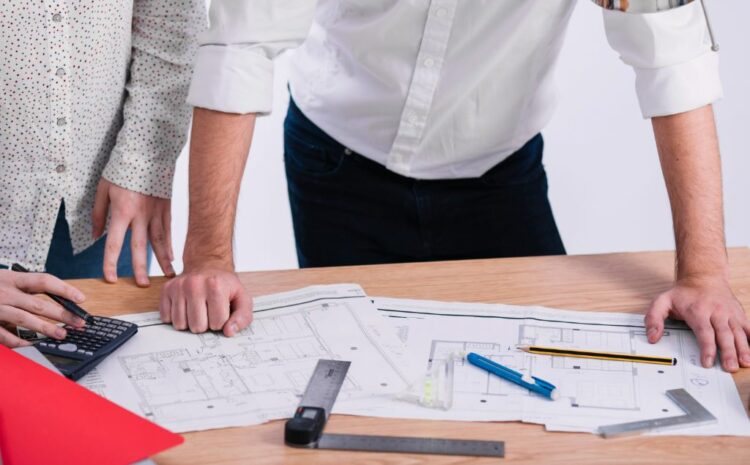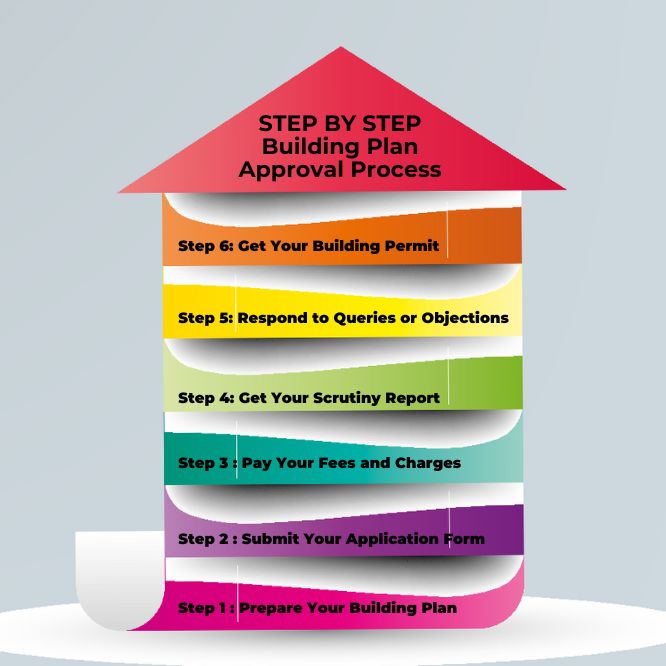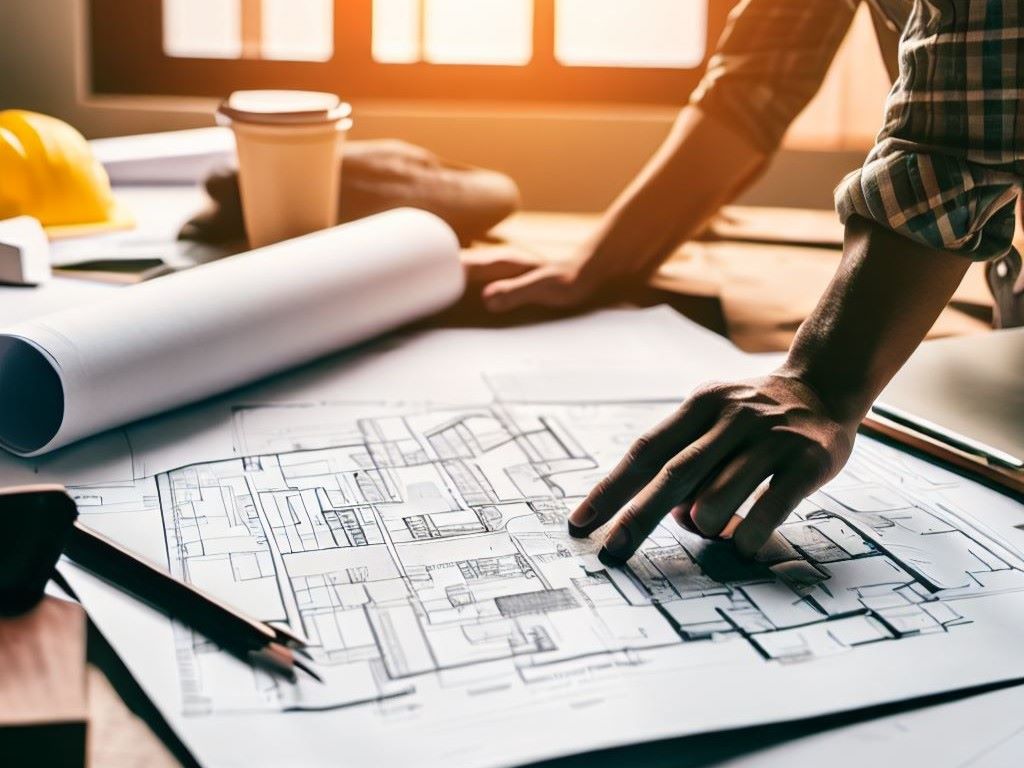
Building Plan Approval Process: A Complete Guide for Homeowners and Developers
Building Plan Approval Process: A Complete Guide for Homeowners and Developers
Table of Content
- Building Plan Approval Process: A Complete Guide for Homeowners and Developers
- What does the process of approving building plans entail?
- Who are the Authorities Responsible for Building Plan Approval?
- What are the Steps Involved in Building Plan Approval Process?
- What documents are needed for obtaining approval for a building plan?
- What are the Common Queries and Challenges in Building Plan Approval Process?
- Summary
- Frequently Asked Questions :-
- Q: What is the building plan approval process?
- Q: Why is building plan approval important?
- Q: What are the documents required for building plan approval?
- Q: How long does the building plan approval process take?
- Q: Can I start the construction before obtaining building plan approval?
- Q: How can I submit the building plan approval application?
- Q: What are the fees involved in the building plan approval process?
- Q: Do I need the assistance of an engineer for building plan approval?
- Q: Will there be an inspection during the building plan approval process?
- Q: Can I demolish an existing structure without building plan approval?
Are you planning to construct a house or a commercial building in India? If yes, then you need to know about the building plan approval process and the documents required for it. Building plan approval is a mandatory procedure that ensures that your construction project complies with the regulations and standards set by the concerned authorities. Without proper approval, you may face legal issues, penalties, or even demolition of your building.
In this article, we will explain everything you need to know about the building plan approval process in India, including the steps involved, the fees and charges, the documents required, and the common queries and challenges. This article will help you understand how to get approval for your building plan and avoid any hassles or delays in your construction project. Read on to find out more.
What does the process of approving building plans entail?

Approval of a building plan involves acquiring consent from the appropriate governing bodies to erect a structure on a specific piece of property. It involves submitting a detailed proposal of your building plan, along with the required documents and fees, to the concerned department or agency. The proposal is then scrutinized and verified by the officials, who may also conduct site inspections and issue queries or objections. If the proposal meets all the criteria and norms, then the approval is granted and a building permit is issued. The building permit allows you to start the construction work as per the approved plan.
Building plan approval is necessary for ensuring that your building conforms to the safety, structural, environmental, and aesthetic standards prescribed by the government. It also helps in preventing unauthorized or illegal constructions that may pose a threat to public health, safety, or welfare. Building plan approval also ensures that your building does not violate any land use or zoning regulations, such as floor area ratio (FAR), setback, height, parking, etc.
Who are the Authorities Responsible for Building Plan Approval?
The authorities responsible for building plan approval vary depending on the location, type, and size of your building project. Generally, there are three levels of authorities involved in granting building plan approval:
- Local Bodies: These are the municipal corporations, municipalities, town panchayats, village panchayats, etc., that are responsible for approving building plans within their respective jurisdictions. They are also responsible for issuing completion certificates (CC) and occupancy certificates (OC) after the construction is completed.
- State Government: The state government departments or agencies, such as the Directorate of Town and Country Planning (DTCP), Revenue Department, Fire and Rescue Services Department, etc., are responsible for approving building plans that fall under their purview. They are also responsible for issuing no objection certificates (NOC) for various aspects of the building project.
- Central Government: The central government ministries or organizations, such as the Airport Authority of India (AAI), Ministry of Environment and Forests (MoEF), Archaeological Survey of India (ASI), etc., are responsible for approving building plans that affect their interests or functions. They are also responsible for issuing clearances or permissions for specific aspects of the building project.
Depending on your location and type of building project, you may need to obtain approval from one or more of these authorities before starting your construction work.
What are the Steps Involved in Building Plan Approval Process?

The steps involved in building plan approval process may vary slightly depending on the state or city where you are constructing your building. However, the general steps are as follows:
- Step 1: Prepare Your Building Plan: The first step is to prepare your building plan with the help of a qualified engineer or architect. The building plan should include all the details of your proposed construction work, such as site plan, floor plans, elevation plans, structural plans, electrical plans, plumbing plans, etc. The building plan should also comply with all the applicable rules and regulations of the concerned authorities.
- Step 2: Submit Your Application Form: The next step is to submit your application form for building plan approval along with your building plan and other required documents to the concerned authority. The application form should be filled in the prescribed format and signed by you and your engineer or architect. You can submit your application form either online or offline depending on the facility available in your area.
- Step 3: Pay Your Fees and Charges: The third step is to pay your fees and charges for building plan approval to the concerned authority. The fees and charges may vary depending on various factors such as location, type, size, category, etc., of your building project. You can pay your fees and charges either online or offline depending on the facility available in your area.
- Step 4: Get Your Scrutiny Report: The fourth step is to get your scrutiny report from the concerned authority after they have verified and checked your application form, building plan, and other documents. The scrutiny report will indicate whether your proposal is approved or rejected or requires any modifications or clarifications. If your proposal is approved, then you will get an intimation letter along with a copy of your approved plan. If your proposal is rejected, then you will get a rejection letter along with the reasons for rejection. If your proposal requires any modifications or clarifications, then you will get a query letter along with the details of the changes or queries.
- Step 5: Respond to Queries or Objections: The fifth step is to respond to any queries or objections raised by the concerned authority within the stipulated timeframe. You may need to submit additional documents, make changes to your building plan, or provide clarifications as per the query letter. You may also need to obtain NOCs or clearances from other authorities if applicable. You may also need to attend hearings or meetings with the officials if required.
Step 6: Get Your Building Permit: The final step is to get your building permit from the concerned authority after you have cleared all the queries or objections and obtained all the NOCs or clearances. The building permit is a document that authorizes you to start your construction work as per the approved plan. The building permit will also specify the validity period, conditions, and restrictions of your approval.
What documents are needed for obtaining approval for a building plan?
The documents required for building plan approval may vary depending on the state or city where you are constructing your building. However, the general documents are as follows:
- Application form in prescribed format
- Building plan drawn by engineer or architect
- Ownership proof of land such as sale deed, lease deed, etc.
- Land use certificate from revenue department
- NOC from AAI if near airport if multi-storeyed building
- NOC from MoEF if near forest or wildlife area
- NOC from ASI if near heritage site
- NOC from fire and rescue services department if multi-storeyed building
- NOC from DTCP if outside municipal limits
- Development plan or master plan of the area
- Site plan showing location, boundaries, dimensions, etc., of the plot
- Floor plans showing layout, dimensions, area, etc., of each floor
- Elevation plans showing height, design, appearance, etc., of the building
- Structural plans showing foundation, columns, beams, slabs, etc., of the building
- Electrical plans showing wiring, lighting, power points, etc., of the building
- Plumbing plans showing water supply, drainage, sanitation, etc., of the building
- Fee receipt for building plan approval
- Any other document as required by the concerned authority
What are the Common Queries and Challenges in Building Plan Approval Process?
Some of the common queries and challenges that you may face in building plan approval process are:
How long does it take to get approval for building plan? The time taken to get approval for building plan may vary depending on various factors such as location, type, size, category, etc., of your building project. It may also depend on the efficiency and responsiveness of the concerned authority and officials. Generally, it may take anywhere between 15 days to 90 days or more to get approval for building plan.
How much does it cost to get approval for building plan? The cost of getting approval for building plan may vary depending on various factors such as location, type, size, category, etc., of your building project. It may also depend on the fee structure and charges levied by the concerned authority and officials. Generally, it may cost anywhere between 1% to 5% or more of your estimated construction cost to get approval for building plan.
What are the consequences of not getting approval for building plan? Not getting approval for building plan can have serious consequences for your construction project. You may face legal action, penalties, fines, or even demolition of your building by the concerned authorities. You may also face difficulties in getting loans, insurance, electricity, water supply, sewage connection, etc., for your building. You may also lose your property value and marketability in case you want to sell or rent your building in future.
How can I avoid delays or rejections in getting approval for building plan? You can avoid delays or rejections in getting approval for building plan by following some simple tips such as:
- Hire a qualified engineer or architect who can prepare a proper and accurate building plan as per the rules and regulations of the concerned authorities.
- Check and verify all the documents and details before submitting your application form and building plan to the concerned authority.
- Pay your fees and charges on time and keep a receipt for future reference.
- Respond to any queries or objections raised by the concerned authority within the stipulated timeframe and provide additional documents, clarifications, or modifications as required.
- Obtain all the NOCs or clearances from other authorities if applicable and submit them along with your application form and building plan.
- Follow up with the concerned authority and officials regularly and politely until you get your approval and permit.
Summary
Building plan approval is a mandatory procedure that ensures that your construction project complies with the regulations and standards set by the concerned authorities. It involves submitting a detailed proposal of your building plan along with the required documents and fees to the concerned department or agency. The proposal is then scrutinized and verified by the officials, who may also conduct site inspections and issue queries or objections. If the proposal meets all the criteria and norms, then the approval is granted and a building permit is issued. The building permit allows you to start the construction work as per the approved plan.
In this article, we have explained everything you need to know about the building plan approval process in India, including the steps involved, the fees and charges, the documents required, and the common queries and challenges. We hope that this article has helped you understand how to get approval for your building plan and avoid any hassles or delays in your construction project.
If you have any further questions or doubts regarding the building plan approval process, you can contact the concerned authority or department in your area or consult a professional engineer or architect who can guide you through the process. You can also visit the official websites of the relevant authorities or agencies for more information and updates.
We wish you all the best for your building project and hope that it turns out to be a success. Thank you for reading this article. Please share your feedback and comments below.
Frequently Asked Questions :-
Q: What is the building plan approval process?
A: The building plan approval process is a systematic procedure that ensures compliance with all the necessary regulations and guidelines for constructing or modifying a building. It involves the submission of documents, payment of fees, and obtaining the necessary approvals from the concerned authorities before commencing construction.
Q: Why is building plan approval important?
A: Building plan approval is essential to ensure that the construction is in line with the set regulations and safety standards. It helps in maintaining the structural integrity of the building, ensuring the safety of occupants, and protecting the environment.
Q: What are the documents required for building plan approval?
A: The documents required for building plan approval may vary depending on the location and type of construction. However, some common documents include architectural drawings, structural drawings, NOC from various departments, ownership documents, and tax receipts.
Q: How long does the building plan approval process take?
A: The duration of the building plan approval process can vary depending on several factors such as the complexity of the project, the efficiency of the authorities, and the completeness of the submitted documents. On average, it takes around 30-60 days in most cases.
Q: Can I start the construction before obtaining building plan approval?
A: No, it is illegal to commence construction without obtaining the necessary building plan approval. It is essential to have all the required permissions and approvals in place to avoid legal issues and penalties.
Q: How can I submit the building plan approval application?
A: The building plan approval application can be submitted directly to the concerned local authorities or through an online portal, if available. It is important to follow the prescribed format and include all the required documents for a smooth application process.
Q: What are the fees involved in the building plan approval process?
A: The fees for building plan approval typically include processing fees, scrutiny fees, development charges, and various other fees as applicable. The exact fee structure may vary depending on the location and size of the construction project.
Q: Do I need the assistance of an engineer for building plan approval?
A: It is highly recommended to seek the assistance of a qualified engineer or architect while preparing the building plans and documents for approval. Their expertise can ensure compliance with the required regulations and adherence to safety standards.
Q: Will there be an inspection during the building plan approval process?
A: Yes, there will be inspections conducted by the authorities at various stages of the construction process to ensure compliance with the approved building plans and regulations. The inspections help in verifying the quality of construction and adherence to safety standards.
Q: Can I demolish an existing structure without building plan approval?
A: No, it is necessary to obtain building plan approval even for the demolition of an existing structure. The authorities need to ensure that the demolition is carried out safely and does not violate any regulations or endanger the surrounding areas.
Transform Your Dream House with the Best Architect
Transform Your Dream House with the Best Architect Company in
Read MoreUnveiling Modern Luxury House Construction Design in Lutyens
Unveiling Modern Luxury House Construction Design in Lutyens Bungalow ZoneIn
Read MoreYour Ultimate Dream Luxury House Construction in Lutyens
Your Ultimate Dream Luxury House Construction in Lutyens Bungalow ZoneImagine
Read More
